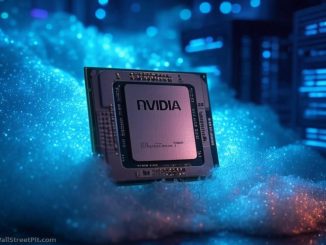
In a testament to the ongoing artificial intelligence (AI) boom, chip giant Nvidia (NVDA) delivered a stellar second-quarter earnings report on Wednesday, surpassing analyst expectations and showcasing the company’s dominance in the AI hardware market. However, despite the impressive numbers, investors responded with unexpected caution, sending shares down over 4% to $120.21 per share in after-hours trading.
The Santa Clara-based company reported earnings per share of $0.68 on a staggering revenue of $30 billion, handily beating Wall Street’s projections of $0.64 EPS and $28.8 billion in revenue. These figures represent a monumental leap from the same period last year when Nvidia posted EPS of $0.27 and revenue of $13.5 billion, underlining the explosive growth in AI-related demand.
Nvidia’s data center business, the crown jewel of its operations, was the primary driver behind this remarkable performance. The segment raked in $26.3 billion, eclipsing analyst estimates of $25 billion and marking a jaw-dropping 154% year-over-year increase from $10.3 billion.
Looking ahead, Nvidia provided an optimistic outlook for the third quarter of fiscal 2025, projecting revenue of $32.5 billion (plus or minus 2%), again surpassing the Street’s expectations of $31.9 billion. This forward guidance highlights the company’s confidence in sustained demand for its AI chips and related technologies.
Nvidia’s CEO and founder, Jensen Huang, emphasized the company’s strategic position in the AI landscape. “Hopper demand remains strong, and the anticipation for Blackwell is incredible,” Huang stated, referring to Nvidia’s current and upcoming chip architectures. He added, “NVIDIA achieved record revenues as global data centers are in full throttle to modernize the entire computing stack with accelerated computing and generative AI.”
Huang also highlighted Nvidia’s expansion beyond hardware into software and networking solutions. “Spectrum-X Ethernet for AI and NVIDIA AI Enterprise software are two new product categories achieving significant scale, demonstrating that NVIDIA is a full-stack and data center-scale platform,” he noted, underscoring the company’s evolving role as a comprehensive AI solutions provider.
The CEO’s comments reflect Nvidia’s ambitious vision for AI’s future across various sectors. “Generative AI will revolutionize every industry,” Huang proclaimed, pointing to the technology’s potential impact from high-end model development to consumer internet services and enterprise applications.
Despite these overwhelmingly positive results and outlook, the market’s initial reaction was surprisingly tepid. The 4% drop in Nvidia’s stock price following the announcement suggests that investors may be grappling with sky-high expectations and concerns about sustaining this breakneck growth rate.
Nvidia’s current market position is formidable, with estimates suggesting it controls between 80% and 95% of the AI chip market. The imminent rollout of its next-generation Blackwell line of chips is expected to further cement this leadership position.
However, the muted stock response might indicate that much of Nvidia’s success has already been priced into its valuation. The company’s shares have soared over 200% year-to-date, reflecting the market’s enthusiasm for AI-related stocks.
As Nvidia continues to push the boundaries of AI hardware and software, the coming quarters will be crucial in determining whether the company can maintain its momentum and justify its lofty valuation.
While the numbers are undoubtedly impressive, the market’s reaction suggests a growing tension between Nvidia’s stellar performance and the sustainability of its meteoric rise in the ever-evolving landscape of artificial intelligence.
- Bulenox: Get 45% to 91% OFF ... Use Discount Code: UNO
- Risk Our Money Not Yours | Get 50% to 90% OFF ... Use Discount Code: MMBVBKSM
Disclaimer: This page contains affiliate links. If you choose to make a purchase after clicking a link, we may receive a commission at no additional cost to you. Thank you for your support!




Leave a Reply